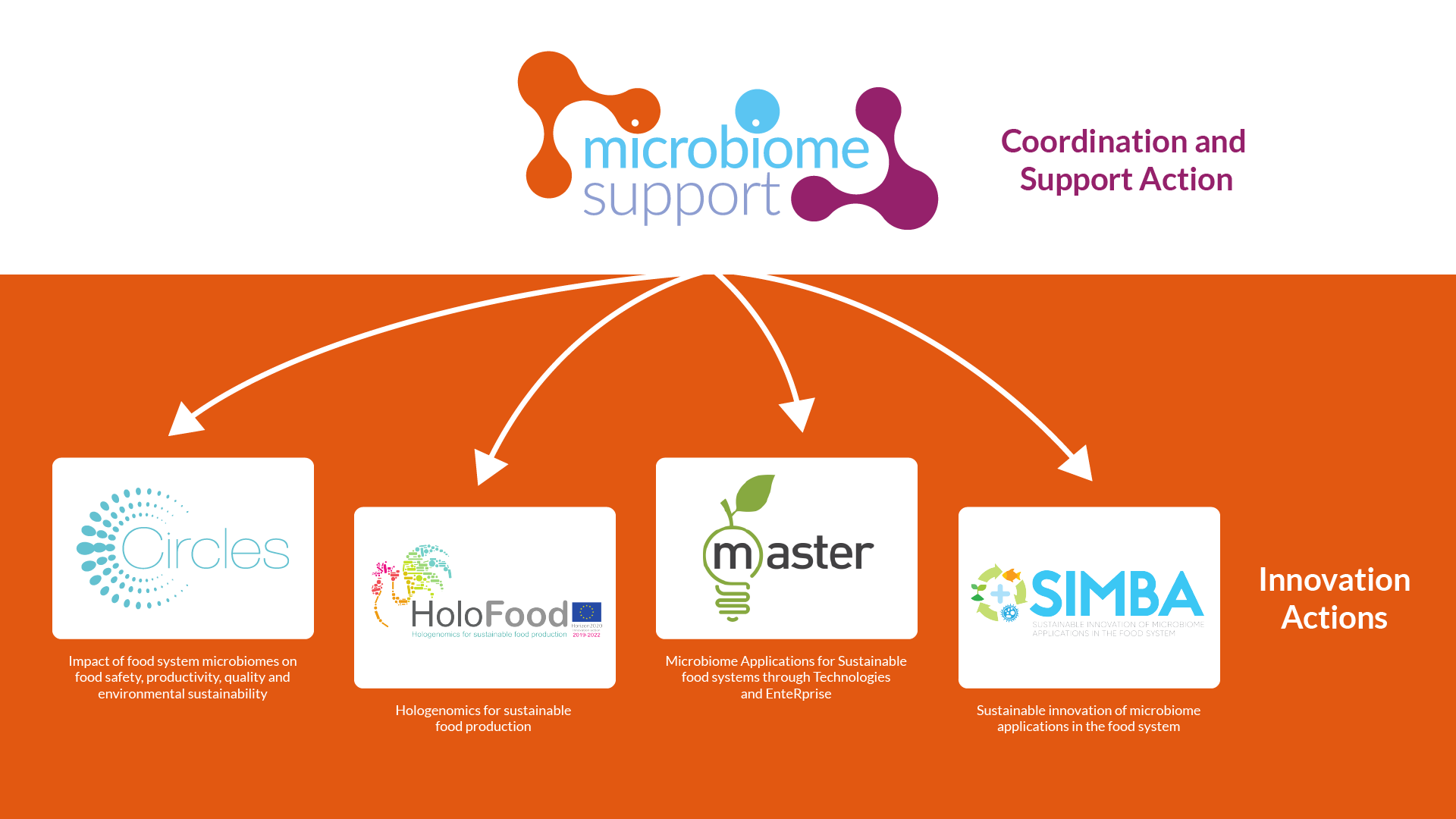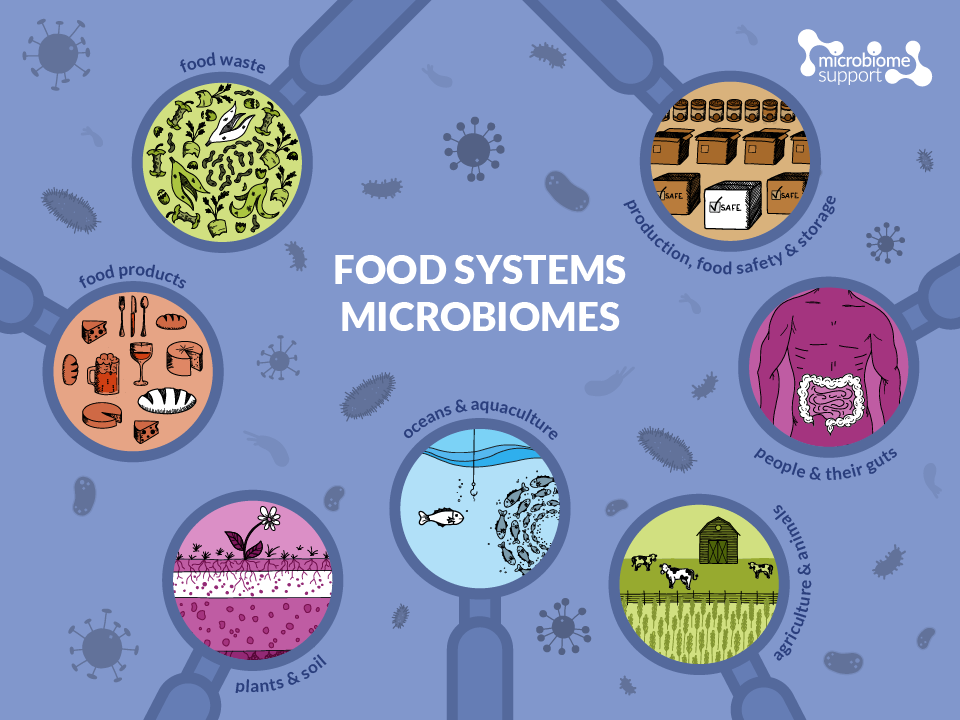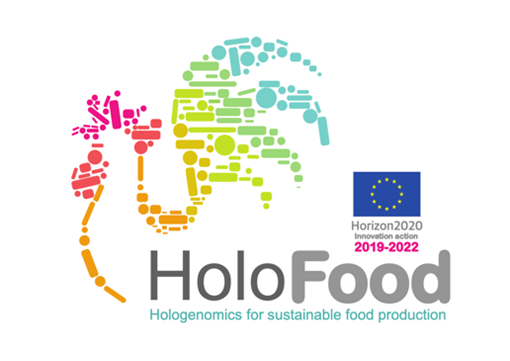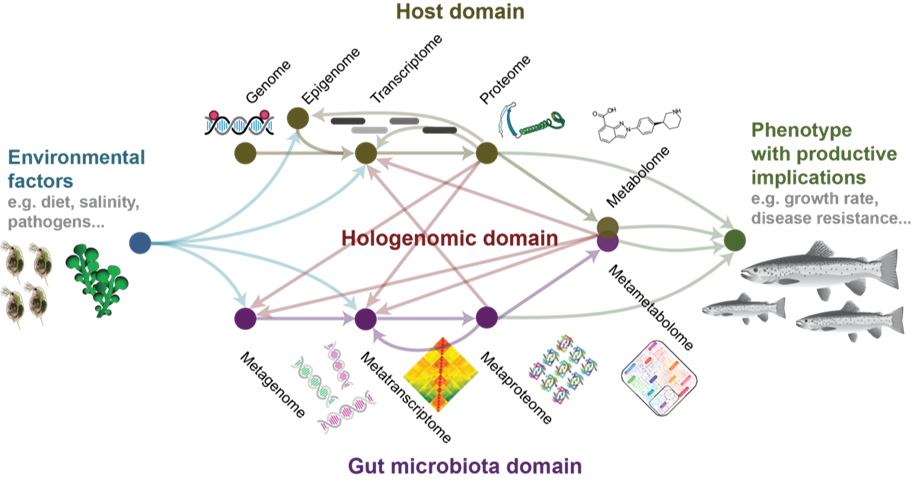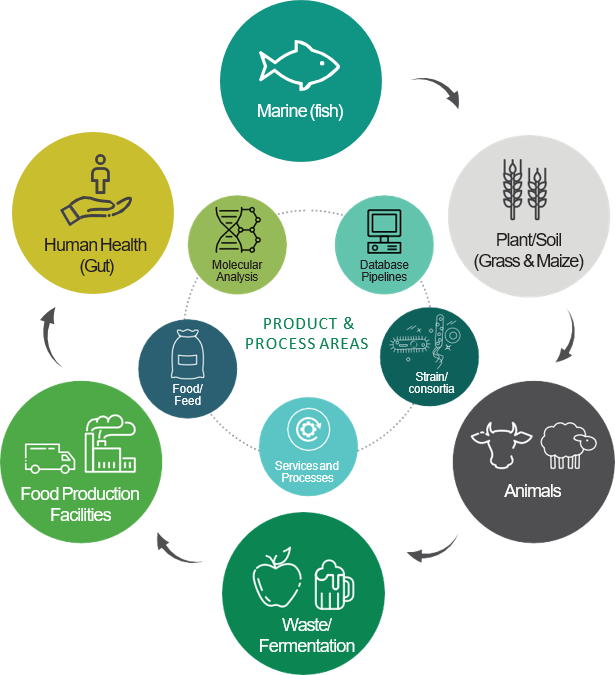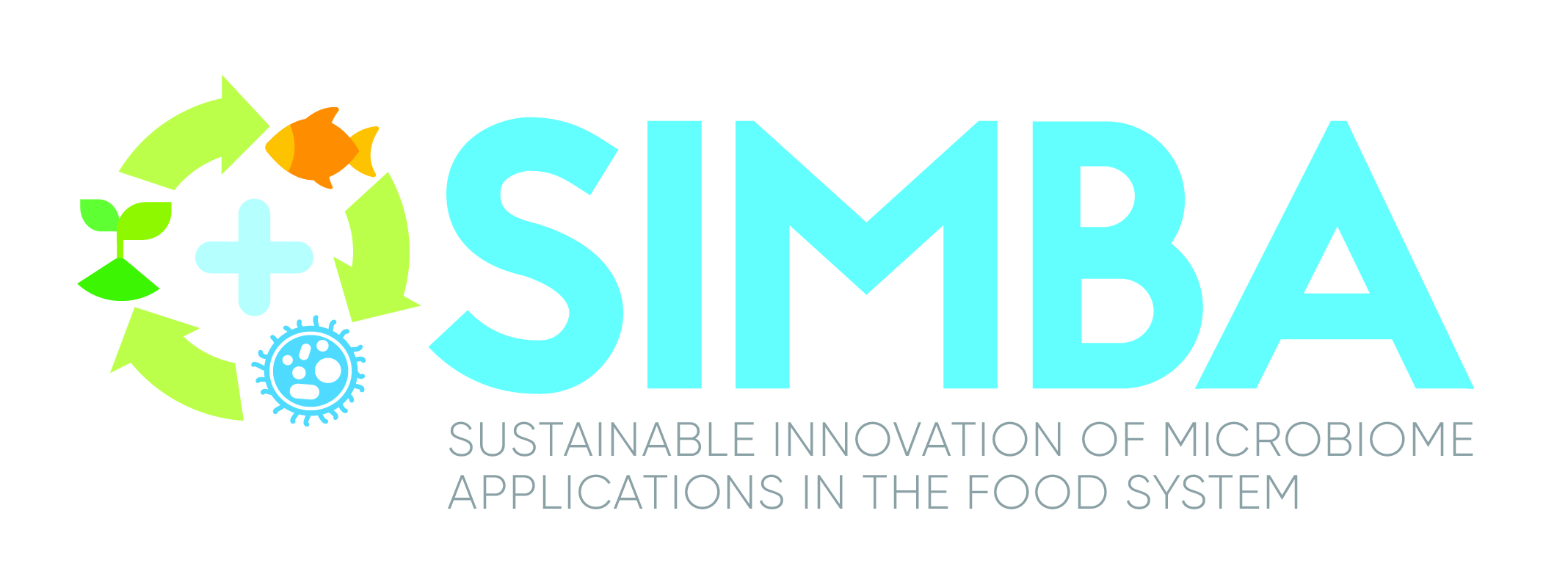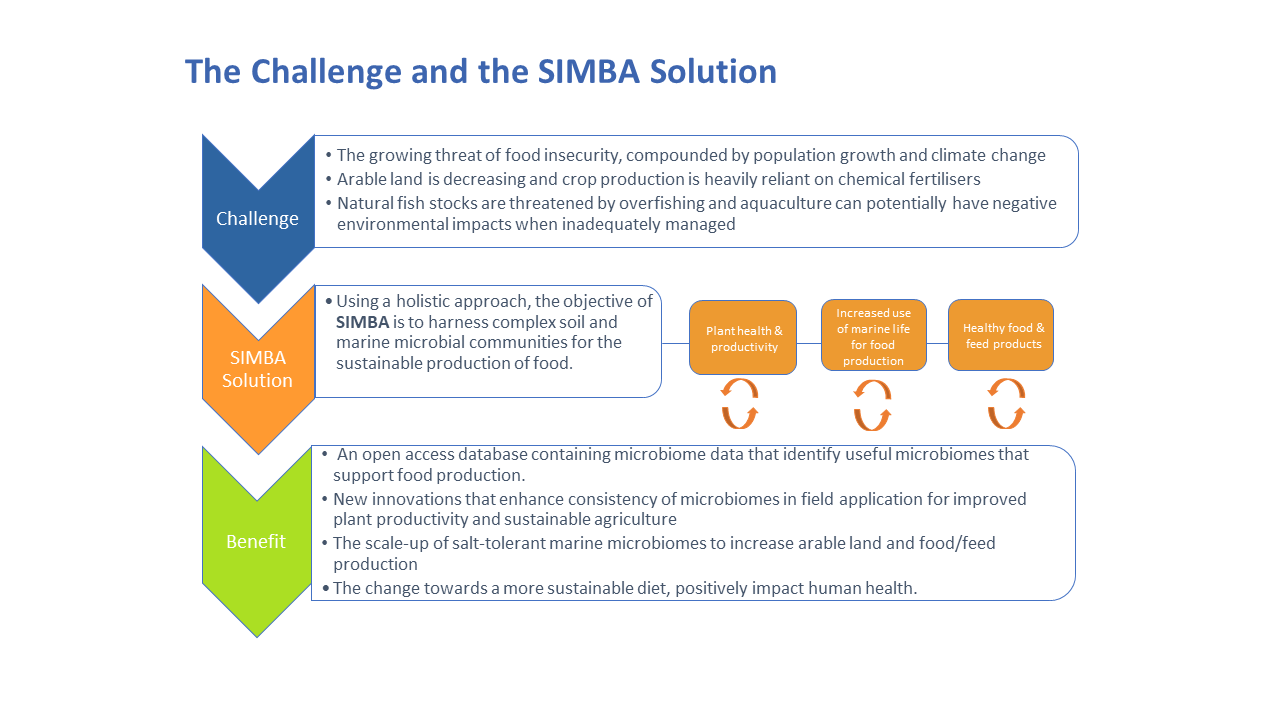Understanding microbiomes is one of the next big scientific frontiers: this understanding will provide meaningful individual and public health solutions, impact on climate change and help transform our food systems. However, research into microbiomes beyond human health is currently limited. To that end, the European Commission has decided to fund five projects on the food systems microbiome that focus on understanding research, policy and regulatory needs, as well as driving microbiome-based innovations within food production.
These projects were MicrobiomeSupport, MASTER, CIRCLES, HoloFood and SIMBA and they worked together to deliver a greater impact. Together they covered a number of food environments where microbiomes significantly impact on the health effects, safety and sustainability of the food we eat; how microbiome knowledge can be applied practically in different farming and production processes is being explored. The objectives:
- raising awareness of the importance of the microbiome in the food system in the hope to improve public acceptance of potential microbiome innovations;
- preparing roadmaps for infrastructure and funding needs to improve microbiome research in general;
- informing on policy and regulatory hurdles that microbiome innovations may encounter on the way to the market; and
- ensuring the engagement of a wide stakeholder network to deliver win-win-win situations for people, planet and profit.
All five projects have joined efforts and created the Microbiomes4Life project cluster. With joint communication material and the use of the hashtag #Microbiomes4Life in social media, we wanted to further raise awareness of the importance of microbiomes in the food system.
MicrobiomeSupport Towards a sustainable and circular, microbiome-based bioeconomy
MicrobiomeSupport was a Coordination & Support Action (CSA) project funded under the Horizon 2020 initiative (grant number 818116), a research and innovation programme by the EU. The project started back in November 2018 and finish in October 2022.
Microbiome research has gained vast interest and recognition in the last decade, yet the research behind it is currently limited and fragmented, with contradictory findings, unaligned research and legislation that focuses on individual microbes rather than communities such as those found in microbiomes.
For this reason, the MicrobiomeSupport project aimed to:
- Build a basis for international action in joint research programmes – the project supported the need for updated research & innovation (policy) agendas to allow for innovative microbiome applications, to improve the safety and sustainability of our future EU food production systems.
- Reinforce collaboration within international networks such as the International Bioeconomy Forum (IBF) to optimise funding of microbiome research both in Europe and worldwide.
- Find alignment on research methods, infrastructure and standards to allow for comparison of results between individual projects, and to ultimately make microbiome research outcomes more meaningful and practical for real life applications.
- Educate the wider public on the potential of microbiomes as well as maintain dialogue between stakeholders on the topic, through the use of multiple communication efforts.
A number of scientific publications have been produced during the project; you can read them here!
Are you interested in MicrobiomeSupport?
The MicrobiomeSupport Association will continue to work on promoting microbiome understanding and applications as key drivers of food security, One Health and human well-being. Check their website.
HoloFood Hologenomics for sustainable food production
Food sustainability is a global concern for both consumers and food production companies. There are many unknowns related to optimising food production, in particular with regards to using natural food additives such as pre- and probiotics to encourage growth and well-being of farmed animals. However, there is still much to be discovered about the impact of such additives on the animal microbiome, and on the animal itself. Unless a more holistic approach is taken, whereby both the host animal and their respective microbiome is examined together in their response to their diet, attempts to improve feed additives may never reach their full potential.
To address this issue, HoloFood, an EU-funded Horizon 2020 Innovation Action (grant number 817729) showcased a holistic approach that improved the efficiency of food production systems, by attempting to decipher the molecular and physiological processes triggered by feed additives across animals with different genetic background and raised under different controlled environments. The HoloFood project (Hologenomics for sustainable food solutions) run from 2019-2022.
HoloFood focused its efforts on optimizing two main food systems that have high importance within worldwide food economy: chicken and salmon. HoloFood characterised not only the animals’ associated microbiomes’ genomes, transcriptomes and metabolomes but also characterised how the microbiome interacts with animals’ genomes and transcriptomes in relation to key performance indices and animal welfare issues. This ‘holo-omic solution’ will then be piloted in commercial production environments in poultry and aquaculture. The knowledge generated will be used by our industrial partners Chr. Hansen A/S and Lerøy Seafood Group, to optimize food additive administration strategies of already implemented products, by tailoring them to the genetic background and developmental stage of the animals, as well as production environment. This will improve the quantity, quality and safety of the produced food, as well as increase the sustainability of food production and animal welfare. HoloFood also served to raise awareness about the importance of microbiomes in food production, and to establish bridges between companies and academia to foster science-based strategies. HoloFood was coordinated by the University of Copenhagen. The innovation action gathers 11 academic and industrial partners from six European countries (Denmark, Norway, Germany, UK, Spain and Poland), forming a dynamic interdisciplinary group of fundamental researchers, applied scientists and industry partners with a track record of bridging basic science to applications in the food industry.
To find out more about the project check out our explainer video here:https://www.youtube.com/watch?v=NSQLffZj-AY or find out more on Twitter @HoloFood_EU LinkedIn page and website www.holofood.eu
MASTER Microbiome Applications for Sustainable food systems through Technologies and EnteRprise
Micro-organisms are found in every ecological niche explored and their existence facilitates ours! We can discover the make-up and function of many microbial communities (microbiomes) using DNA sequencing technologies. Scientists within the MASTER project used high throughput sequencing technologies to map microbiomes across a range of food and non-food environments. MASTER took a global approach to the development of microbiome products, foods/feeds, services or processes with high commercial potential, to improve the quantity, quality and safety of food. Knowledge generated within MASTER will improve plant, soil, animal and human health and reduce the demand for traditional insecticides, fertilizers and antibiotics.
MASTER was an EU-funded Horizon 2020 Innovation Action project (grant number 818368) that got underway in 2019, bringing together 30 partners from 14 European countries. In this third year of the project, we faced a much different world than when we started our journey on MASTER. However, despite the challenges and impacts of COVID-19, we have collected ~1800 samples from >110 food production industries across Europe. In addition, research on MASTER spans microbiomes in soil and crops, microbiomes in aquaculture and the marine environment, rumen microbiomes and human microbiomes. During the project, we harnessed this microbiome knowledge to enhance the health, sustainability and resilience of fish, plants, soil, animals and humans, improved professional skills and competencies, and supported the creation of jobs in the food sector and bio-economy.
The specific objectives of the MASTER project were to:
- Develop microbiome-based solutions to improve fodder crop production and to increase the use of sustainable feeds in the fishing industry.
- Use microbiome-based diagnostics in real time in these industries for pathogen detection and to improve production.
- Alter the rumen microbiome resulting in increased feed efficiency and reduced methane emissions.
- Develop technologies to monitor rumen microbiome markers and to predict ruminant characteristics.
- Optimize fermented food microbes and processes to add to the value and health-promoting properties of selected substrates, in particular those from waste streams.
- Support the design of novel functional foods by studying the relationship between foods and the human gut microbiome.
- Assess means of testing the impact of food ingredients on the gut microbiome, with a view to improving human health.
- Map the microbiomes of food-producing facilities and to validate technologies and software tools for microbiome analysis and pathogen detection in foods.
- Develop databases, tools and resources for the food-chain industry to be use beyond the end of the project.
- Promote understanding and interest in microbiome-related applications for the food industry, through communication towards and engagement of end-users.
- Bring to market new and cost-effective applications to assist at different stages and processes throughout the food chain.
Please follow our research on MASTER by browsing through our PUBLICATIONS on the www.master-h2020.eu website and on Twitter @MASTER_IA_H2020.
SIMBA Sustainable Innovation of Microbiome Applications in the Food System
SIMBA was an Innovation Action project, funded under the EU’s Horizon 2020 Funding Programme (grant number 818431), which provided a holistic and innovative approach to the development of microbial solutions to increase food and nutrition security. SIMBA focused on the identification of viable land and aquatic microbiomes that can assist in the sustainability of European agri- and aquaculture.
The threat of food insecurity is a critical global challenge, compounded by climate change and population growth. Forward-thinking solutions are needed to meet this challenge. One potential area for exploration is microbiomes: communities of microbes (bacteria, viruses, fungi, etc.) in a certain environment. Microbiomes are known to regulate the productivity and health of major food sources across land and sea. Therefore, they can play a positive role in food production, and food and nutrition security, ultimately influencing human health. However, we lack a deep understanding of the microbiomes associated with our food systems.
Focusing on crop production and aquaculture, the SIMBA project intended to:
- Get a better understanding of microbiome structures and functions, related to land and sea, and food chains.
- Verify the sustainability of microbial innovations of the food systems as a whole.
- Create a better EU Agri-Aqua-Food system that is resource efficient, climate resilient, sustainable and consumer centered.
- Improve the overall knowledge of microbiomes from land and sea towards the market needs in areas where applicability and readiness are not yet visible.
- Bring new and cost-effective commercial applications to the market that assist different stages and processes throughout the food chain by 2025.
For more information, please visit simbaproject.eu or follow @SIMBAproject_EU on Twitter.

